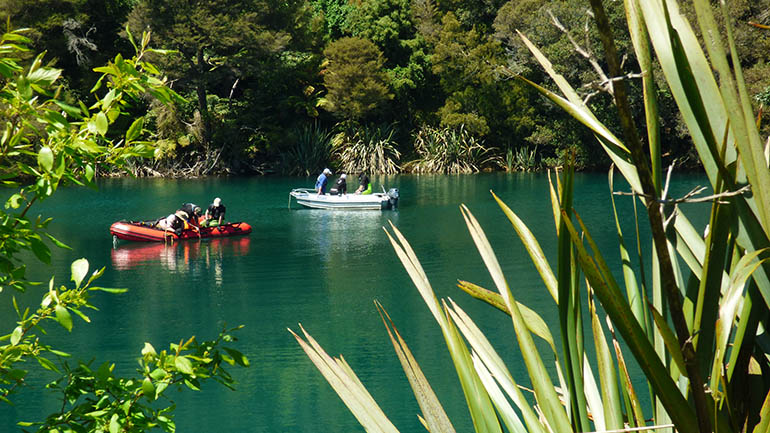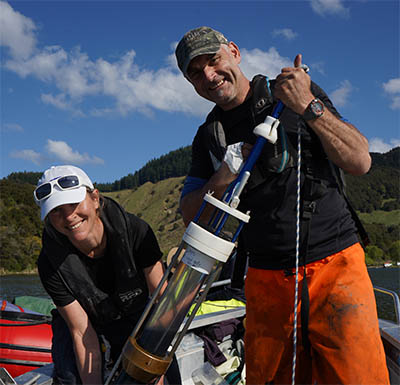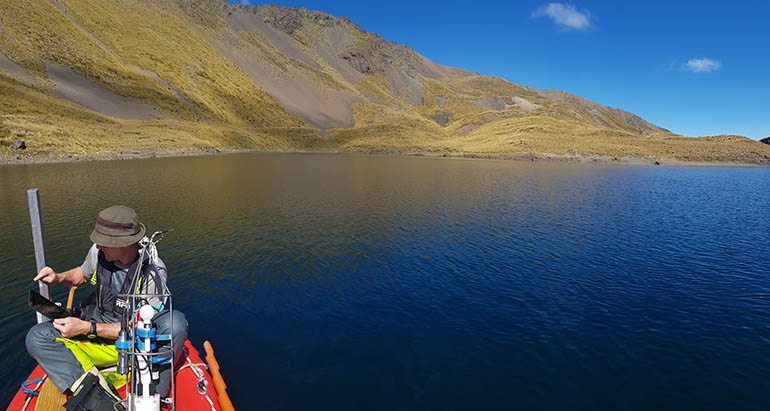Examining layers of history to protect lakes in Aotearoa New Zealand
The Ministry of Business, Innovation and Employment (MBIE) has awarded a team of researchers from GNS Science and The Cawthron Institute the Endeavour Fund’s highest rating of Gold Status for their research into the current, and historic, health and biodiversity of lakes across Aotearoa New Zealand.
On this page
Lakes380 was the largest study of lakes in the country’s history, sampling a diverse spread of about 10% of naturally occurring lakes to get an understanding of their health now, and back through time.

A portal to the past
Programme co-leader Dr Susie Wood (Cawthron Institute) said over the past 5 years a team of around 50 national and international researchers used a suite of techniques to sample surface water and sediment samples and layers of mud from sediment core going back 1,000 years.
“Those layers act like pages of a history book. We can analyse them to understand more about whether the health of our lakes has changed and how and why it's changed,” said Dr Wood.
Programme co-leader Dr Marcus Vandergoes (GNS Science) said this snapshot of history provides important baseline information.
“Through this research, we’ve learned more about some of the pressures that might have been acting on our lakes through time and how they have responded.
“This historical context can help guide future management, mitigation, and restoration, including setting informed restoration targets and deciding what values inform those efforts, whether they are cultural or economic, or other community values,” said Dr Vandergoes.
Endeavour Fund’s impact
Dr Vandergoes said the Endeavour Fund was hugely important to the project’s success, allowing them to think big and bring together a diverse group of researchers.
“The scale of what we undertook for this national project was huge and it had a lot of moving parts.
“The Government funding was vital, to achieve this scale of project,” said Dr Vandergoes.
Cultural and community values were a big focus of the Lakes380 project. As well as the biophysical, in selected regions the research also looked at the social and cultural history of lakes.
This included 4 rohe studies where the project worked in partnership with iwi.
Dr Wood said this was a hugely enriching and rewarding experience.
“Our scientific research only provides one layer of knowledge and information, and we hope that we can support and further empower community groups and iwi-led restoration projects. Contributing to the aspiration of these amazing group was a really rewarding outcome the project,” said Dr Wood.
Turning information into action
The project, which wrapped up in June, is already having extensive and diverse impacts.
The data generated is assisting with the implementation of the National Policy Statement for Freshwater Management, with many regional councils using the team’s measured or predicted lake water quality data to inform which lakes they prioritise.
 Lakes380 also saw the development of some “game changing” innovative techniques and tools, such as developing a method to reconstruct historical biological communities based on DNA traces in sediment layers.
Lakes380 also saw the development of some “game changing” innovative techniques and tools, such as developing a method to reconstruct historical biological communities based on DNA traces in sediment layers.
For a lake in the Gisborne region, researchers were able to reconstruct 1,000 years of fish biodiversity and see how the fish community was impacted by changes in land use.
Dr Wood said one of the biggest takeaways for her was the importance of getting the community involved in this kind of research.
“If we're going to improve the health of our lakes, we need to bring society with us and we need to encourage society to think about our freshwaters and our lakes. Science communication and outreach became a really important part of the project. For example, we have over 100 videos on our YouTube channel, we created a lakes specific outreach programme for tamariki, and developed a lake-specific teaching resource with the Science Learning Hub,” said Dr Wood.
The team’s work in this area was recognised recently, with them winning a National Science Communication Award.
The SCANZ Excellence in Science Communication Award(external link) — SCANZ
Looking to the future
Lakes380 leaves a big legacy, with many smaller projects are already springboarding off the data and sample sets and working relationships.
And the work continues, with researchers being granted a further 5 years of Endeavour funding for their next project - Our Lakes, Our Future.
“About 45% of our lakes are in poor or worse than poor condition. Our Lakes, Our Future focuses on developing a much more holistic way to think about lake health.
“And the team will be focusing on how we restore and revitalise our precious lakes and how we make sure our resources are used effectively and efficiently,” said Dr Wood.


